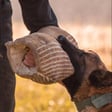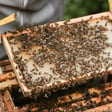Introduction of Host and Guest
00:00:03
The Jobs Podcast
Hey folks, you're listening to the jobs podcast. I'm your host, Tim Hendricks. And our guest today is Dr. Karen Kelly. She has a pretty unique job. She is a physiologist and she specializes in warfighter performance.
00:00:16
The Jobs Podcast
So welcome doctor. Thanks for joining me today.
00:00:19
Karen Kelly
Thank you for having me.
00:00:21
The Jobs Podcast
So let's start off. We get right to it. We don't dilly-dally around on the Jobs Podcast. Let's start with the early origin story of
Dr. Kelly's Background and Influences
00:00:28
The Jobs Podcast
Dr. Kelly and kind of a quick upbringing about where you were born, early influences, family members in in your line of work, or maybe not, and just go from there.
00:00:38
Karen Kelly
Okay, that sounds great. Well, I was born and raised in Pasadena, California, just actually up off of Eaton Canyon, where we just had the recent fires. And i lived there my entire life until I moved down to San Diego for college. But ah my entire family was actually in ah business, except for my dad did have an early education in physical education, and he ran the Lockheed Employee Recreation program for Lockheed Martin when they were based out of Burbank.
00:01:04
Karen Kelly
So I guess you could say my dad was probably my early influence.
00:01:08
Karen Kelly
He played baseball throughout his entire life, went to college on a baseball scholarship, um played in the minors and was pulled up for the Orioles for a few years. So I just grew up living a very active lifestyle, has always been interested in sports,
00:01:22
Karen Kelly
played sports my entire life. And so um I'd say he's probably my most an influential person. However, my mom also was an avid cook. She was Italian.
00:01:33
Karen Kelly
So I also was just raised very healthy and, ah you know, like healthy lifestyle, healthy living, very active, you know, growing up on the Canyon, we hiked every weekend, you know, built forts and played like, you know, kids did back, back in the seventies and eighties.
00:01:48
Karen Kelly
yeah, to date myself. Yeah.
00:01:50
The Jobs Podcast
No, it had to be home when the streetlight came on was about the the rule in my house. Yeah.
00:01:54
Karen Kelly
yeah Exactly. same Same here. And they usually hose us off in the driveway because we were so dirty and you know ah prior to coming in the house. you know So,
00:02:04
The Jobs Podcast
Did you have any early interest in, I mean, I know you were active and your parents were involved in sports to
Career Shift to Exercise Physiology
00:02:10
The Jobs Podcast
varying degrees. Did you know that something related to athletics would be in your future? Or when did you kind of start to to narrow into physiology?
00:02:21
Karen Kelly
I have always been interested in sports and athletics, and I wanted to go into sports medicine, actually. I was going to go to medical school. I took my MCAT. I was going to go down that whole route.
00:02:32
Karen Kelly
And then one day, i just decided to pack up all my things with my friend and put it all in my parents' garage, and we went backpacking for six months, um you know, and just decided to try and figure out
00:02:44
Karen Kelly
what I really wanted to do. I think at the time I was volunteering, I was an EMT. I'm in a small hospital here in San Diego that no longer exists. I worked in the emergency room. And I think just being raised very naturopathically, not that I'm not against Western medicine by any stretch of imagination.
00:02:59
Karen Kelly
It's just, that I think the way was raised very healthy, holistically, i just saw that a lot of our medical care was more of pushing pharmaceuticals, which is not the way I was raised.
00:03:09
Karen Kelly
And so I just decided to go down a different path. Like I didn't decide I didn't want to go down that path. But at the time, I didn't know what it was. So my one of my best friends and i backpacked for six months throughout Southeast Asia back in the late 90s.
00:03:23
Karen Kelly
And ah a lot of the times we, you know, be alone in a tent or, you you know, on a boat somewhere. And we would just talk about what I like to do, what my interests were. And she you know She said, you always like exercise. You always like nutrition. Why don't you go into that field?
Educational Journey and Decisions
00:03:38
Karen Kelly
And you know back in 1997, exercise science, exercise physiology wasn't a ah large um area. So I didn't really know what I could do in that field.
00:03:48
Karen Kelly
But I decided just to take my GRE when I came back. um My parents sent me a study guidebook to Singapore. I picked it up in a post office, studied for three months on the back half of my trip and came home and took the last base paper-based exercise.
00:04:03
Karen Kelly
GRE and then said I'd just go to grad school for something and figure it out and I happened to stumble upon a program at UC San Diego that was an exercise science certificate program it wasn't a degree but when I started that program all my teachers had master's degrees in exercise physiology from San Diego State and that's where it pointed me to that direction of going down this that career field so it's just kind of a random me Google searching or not even, I think the internet was still pretty young at the time, but like looking web media, like dot matrix style, like trying to ah find information i or you know, just kind of boots on the ground of like, you know, talking to people and, you know, asking them what they did and how they got to where they were.
00:04:34
The Jobs Podcast
web Web crawler or something like that.
00:04:38
The Jobs Podcast
Yeah, yeah. and
00:04:48
Karen Kelly
And that's how I figured out, you know, sort of this exercise physiology, you know, path. So it wasn't conventional.
00:04:54
The Jobs Podcast
The exercise...
00:04:56
The Jobs Podcast
The exercise physiology program, that's not just a four-year degree. You're going to extended training afterwards. is it or Does almost everybody get a master's
Career Paths in Exercise Physiology
00:05:06
The Jobs Podcast
or PhD? How does that typically work?
00:05:08
Karen Kelly
ah Yes, you can do both. So my um most of the the people that work on my team, for example, my research team, they all have master's degrees.
00:05:15
Karen Kelly
And so one of my ah students sets up a USC. She's obviously earning her doctorate. But the majority of people in our field do just have master's. If you want to seek the higher um level of education and you know become a principal investigator like myself or.
00:05:29
Karen Kelly
you know, have a ah different type of career path than you would go on for PhDs. So there are undergraduate programs in exercise science, exercise exercise physiology, but really the graduate level is what's needed um to really land a good position, let's say with a sports team or or in the military, for example.
00:05:47
The Jobs Podcast
So what you just mentioned right there, where do most of the people that follow your career path end up as far as is it more a private sector, a line of employment, or is it more academia or is it kind of split down the middle?
00:06:03
Karen Kelly
I think it's both, you know, not so much academia, because and to be in academia, you do need your doctorate to to have a full time tenure track position at the majority of universities. You can be adjunct professors or do so or teach at community college with a master's degree. But really, for a four year university, they typically require a Ph.D. level ah degree.
00:06:23
Karen Kelly
So, for example, in research, you know, when I was at the Cleveland Clinic, I did my postdoc at the Cleveland Clinic, and we had a lot of master's students there that were working on various grants and projects within um our department, ah within the government sector. ah Most of our research assistants, and there's varying levels of senior scientists, one, two, three, for example, through our contract agencies, they all have their master's degree in in exercise science of some sort, you know, depending on the needs of the principal investigators. So,
00:06:53
Karen Kelly
You see that um with sports teams. I have a lot of friends that are working with various sports teams or rehab clinics ah or wellness programs or wellness clinics that have their master's degree.
00:07:06
The Jobs Podcast
Well, did you, did you have anything lined up like you were already working in your field as you progress through the final stages of your education, or did you go straight through and then enter the workforce with your training?
00:07:22
Karen Kelly
No, I actually so I have a pretty unconventional path in the sense that I so I did my undergraduate degree in biology um at UC San Diego when I thought I was going to go premed. And I finished my degree um in about three, three and a half years.
00:07:37
Karen Kelly
I finished school early. So I was fairly, fairly young still. So I took a year off to study for my MCATs when I thought I wanted to go to medical school.
00:07:43
The Jobs Podcast
Hmm. Hmm.
00:07:45
Karen Kelly
And then when I didn't do that, I came back to grad school. I went through to my my master's degree, which took two years. And then I went straight to my doctoral program at but USC.
00:07:56
Karen Kelly
And that took me a little bit longer than normal. USC's typical programs are usually about five years, but mine took a little longer because I was married and I got pregnant with my son at the time. So I had to take some time out of the lab.
00:08:07
Karen Kelly
um at the At the time there, i was working on ah we i was working with some radioactive compounds. So I didn't obviously want to be in the laboratory when I was i'm pregnant with my son. So I took ah some time off and just taught.
00:08:19
Karen Kelly
And then I went straight from there into a three-year postdoc. So when I finally secured my job um with the Navy, and my mom, ah if she was still alive today, would tell you she was so happy because it was finally in her mind my first real job um because I had just been in training training forever, you know, like, you know,
00:08:35
The Jobs Podcast
right. right
00:08:36
Karen Kelly
ah you know four years undergrad, two years master's, so that's six, five, six years of PhD program, 12 years, and three years of postdocs. It was like a 15-year training evolution for me prior to like you know really securing a first job.
00:08:50
Karen Kelly
I mean, as a postdoc, you're paid, obviously, but it's not commensurate with a salary that you can actually live on. you know So um it's a long...
00:08:58
Karen Kelly
and from my For me, because I had started a family um in there, I had my daughter during my postdocs, so you know I balance profession and ah family life. Some people choose not to do that. So it really just depends on the individual and if they you know they want to start a family while they're in the middle of their schooling or if they want to wait um to do that.
00:09:19
Karen Kelly
But not everyone has to do that. Not everyone does postdocs. I highly recommend them. um Not everyone gets a master's degree. Some people go straight from undergrad to PhD. I feel the master's is a really important step, but that's just from my time in education.
00:09:36
Karen Kelly
You know, that I think it really gives people an interim time to really dabble in research, decide if that's something they really would like to do, kind of learn more of that self-study that goes into a PhD program. So it just depends on the individual and really what their career goals are.
00:09:50
The Jobs Podcast
So you finished up, you as you described it, or your mom described it, you got your first real job
Navigating Opportunities in Military Performance
00:09:56
The Jobs Podcast
ah with the Navy.
00:09:57
The Jobs Podcast
what What did you start doing with the Navy, and how did you morph into the warfighter performance aspect of your job?
00:10:06
Karen Kelly
Well, my my position with the Navy also came very randomly. And this is something that I always encourage my students um to do as well as like through networking. So I basically cold emailed my predecessor at the time as in the Cleveland Clinic and I wanted to move back ah to California.
00:10:23
Karen Kelly
And so I started looking at positions. You know, I was I was. going to take a tenure track position at a university and in Washington, Indiana, Georgetown. And as myself and another candidate were up for this final position.
00:10:35
Karen Kelly
However, at the time, unfortunately, was I was going through a divorce. So I wanted to go back home where my family and everyone was. So I started to look for opportunities back in California.
00:10:44
Karen Kelly
And I honestly was just searching. And I came across ah the command that I work at now And I cold emailed my predecessor and he said at the time he had no positions available. And that was, I think, in January of 2010.
00:10:57
Karen Kelly
You fast forward to the end of May and I was speaking at the American College of Sports Medicine's annual conference. um my mentor at the Cleveland Clinic was supposed to give a keynote address and he couldn't.
00:11:10
Karen Kelly
And so he asked me to fill in for him. So I filled in for him and then just went to the job board and started looking at the job postings that ACSM is really good about. And there was a flyer, from this guy I cold emailed and I reached out to him through the conference. You know, i emailed him.
00:11:26
Karen Kelly
said, I don't know if you remember me. um He's like, oh, I do. So we met in person and we chatted and that's kind of how it all started. And so, you know, i do encourage people to really, you know, check the job boards at conferences, reach out to people.
00:11:39
Karen Kelly
you know, I tell students this all the time, people that you'd like to work with, they might they might not have something for you at the time, you know, but if you reach back out to them, at least you've already left a little mark, you know, in their memory.
00:11:50
Karen Kelly
So that's how,
00:11:50
The Jobs Podcast
Sure. Well, it never hurts. Never hurts to ask.
00:11:51
Karen Kelly
Oh, no, I have i have students, i have people reaching out to me through, you know, LinkedIn all the time.
00:11:52
The Jobs Podcast
Never hurts to ask.
00:11:57
Karen Kelly
I just talked to a student at the end of last week that reached out to me through, through there just asking me questions on, you know, career opportunities, internships, mentorship and things like that. So, so yeah, so I did that and then came out for an interview and got the job.
00:12:12
Karen Kelly
So it was pretty, pretty straightforward. um
00:12:16
Karen Kelly
I had no idea. anything about working in the military sector. I mean, I've been working in obesity related diseases prior to that and, you know, exercise and sport, but you know, it's, it was just a matter of translating my information and my knowledge and, you know,
00:12:33
Karen Kelly
talking to a lot of people, embedding myself in different communities that I was working with to really understand their needs um of their, you know, their needs and and figuring it out from there. So when when I came out to my my first assignment with the Navy, it was looking at load carriage or back injuries you know, back pain in our infantry Marines. And so I basically just spent a lot of time at Camp Pendleton with various Marine groups, talking to different people, observing, you know, and that's how I,
00:13:03
Karen Kelly
you know started my career there.
00:13:06
The Jobs Podcast
So let's dig into that a little bit as far as what your day-to-day job would
Optimizing Military Readiness
00:13:12
The Jobs Podcast
be like. him what When you say you're observing stuff, are you watching people do different job tasks and then seeing or looking for areas where there may be a way to improve their movement or a safer way to do something? is that I mean, i'm I'm grossly oversimplifying, I know, but.
00:13:30
Karen Kelly
you know, honestly, it really depends on the project. And so our our projects are funded. So we write grants. Our command is, a you know, like ah ah analogous to like an academic institution. So we write grants and we receive funding similar to, you know, anyone in academia.
00:13:44
Karen Kelly
And that funding or the grant calls are based on where the National Defense Appropriation Act is. So where Congress has decided that money is funded. is allocated to. And so, you know, it's it's varied over the years. um But fortunately for, you know, my team and myself, you know, we've always been in, ah you know, physical readiness, physical fitness, physical standards.
00:14:07
Karen Kelly
So, you know, kind of in it and injury prevention, human performance optimization, which kind of is a common thread throughout um all the years, you know, especially since we were at war for so long.
00:14:18
Karen Kelly
And then in the end, now we're in peacetime. You know, we still have this ah push to make sure our physical standards are correct and correct. and you know, looking at physical readiness and the, you know, physical capabilities of our, of our military. So um it really just kind of depends on what the requests are.
00:14:37
Karen Kelly
um Sometimes you get direct requests from different um groups that you're working with, you know, to help them um address it a knowledge gap or a capability gap, or if they want to expand their capabilities into a certain area.
00:14:48
Karen Kelly
So it's not a cookie cutter type.
00:14:52
Karen Kelly
Yeah. um Type research.
00:14:53
The Jobs Podcast
It's real custom.
00:14:54
The Jobs Podcast
It's real custom, isn't it?
00:14:55
Karen Kelly
It's custom and you also have to be pretty um like my team and I are comprised of like I say more and more systemic physiologists with an emphasis in exercise physiology. I do have performance dietitian, athletic trainers, strength and conditioning coaches, the whole gamut.
00:15:09
Karen Kelly
ah You know, all of us are sort of cross like multidisciplined in that aspect.
00:15:13
Karen Kelly
So we can cover a wide range of different you know efforts. But But it is really solid research. You know, you follow the research process where a lot of times it is observation and characterization of the community to identify what are their needs, you know, what are, what is causing the most injuries, you know, or what is causing,
00:15:31
Karen Kelly
ah um I if they want to expand their capabilities for um work in in extreme environment type conditions. So whether it's altitude or Arctic or heat or, you know, or undersea or whatever it may be, whatever the environment is that they need to go into.
00:15:47
Karen Kelly
And so then you have to really. understand, you know, the human body A from the beginning. And then, you know, as physiologists, we already know that, but then you start really targeting reading on, you know, how does the body adapt to heat or how does the body adapt to cold? So you just re remind yourself of things that you studied probably back when you're in your schooling, but then you, you dive deeper into that area of, um, area publication or that area of research that's going to most help you understand what the military needs for that environment, if that, if that makes sense. So.
00:16:18
The Jobs Podcast
No, it does make sense. Is there one particular group that you typically, depending on the branch of the military that you're dealing with, is there one particular group that you typically start with?
00:16:28
The Jobs Podcast
Is it usually special forces or is it, you know, how does that play out?
00:16:33
Karen Kelly
No, it just really depends on the who has what needs. And then sometimes, you know, is it with any in any world like who, you know, so if you have no other professionals in a different group, whether it's the infantry or special operations or the army, like my team and I've worked with with many different types of groups over the years.
00:16:51
Karen Kelly
Then, you know, so it's knowing the leadership, understanding what they do. um For us, we we started doing field research initially. So we've never done lab-based research. So when you're out in the field and you're talking with different individuals and you're talking to leadership and you're briefing leadership, and then they get wind of what you're doing. And then it's, you know it's, then they tell someone else and then, you know, word gets passed on your specialty and your capabilities.
00:17:13
Karen Kelly
And then that's how you get, you know, hook you know connected with other groups. You know, plus for myself, I sit on a lot of different committees, um, tri-service committees. And so through those, you know, collaboration, collaboration, basically collateral duties that I do, you know, I meet a lot of different people, um, in different, in different branches of service where you then work on collaborations.
00:17:34
Karen Kelly
And, and so that's kind of how you meet, um, meet the groups. It's not, it's not like a typical research path, if that, if that makes sense. So,
00:17:42
The Jobs Podcast
No, it does.
00:17:43
The Jobs Podcast
Yeah, it makes sense. And you mentioned something a second ago about um dealing with either extreme cold or extreme heat.
Hydration Strategies in Extreme Conditions
00:17:51
The Jobs Podcast
I've made a career in the fire service, and one of my current jobs now, on a very basic level, is to deal with the hydration of the fire crews when we have working fires.
00:18:02
The Jobs Podcast
And so, you know, in January, it's not much of a concern to get dehydrated. In August in Missouri, when the humidity is through the roof and it's 99 degrees and you're wearing 55, 60 pounds a gear, it's very unpleasant to say the least. And electrolytes and hydration become ah a main priority.
00:18:23
The Jobs Podcast
Are there, and I'm using this podcast as an opportunity to help myself improve my job and help the guys that I serve. Is there any advice you could give me as far as what I could do to improve their working environment and keep them safe?
00:18:40
Karen Kelly
Well, one is definitely, yeah, make sure you're on your hydration electrolytes. so Obviously, I can't endorse any type of product, but, you know, I would say always finding the balance between like having enough sodium and your you potassium, your chloride, your magnesium, your calcium, which is another one that people often forget about is that calcium is really important for muscle contraction, relaxation,
00:18:46
The Jobs Podcast
Sure, sure.
00:19:00
Karen Kelly
um you know, heart function. So making sure you're, you have a balanced, you know, electrolytes and also balanced food.
00:19:06
Karen Kelly
You know, sometimes we forget that the caloric intake or having adequate calories is really is what's going to help us sustain. And when you're saying when you're hot and you're dehydrated, it oftentimes our, you know, our hunger mechanisms suppressed. And so we don't really want to eat, but finding foods or eating foods that are, you know, high in water content, high in electrolytes,
00:19:23
Karen Kelly
um you know, are really helpful. And then, and, you know, just and being proactive about it consistently. ah know you can't predict when a fire is going to happen, but it's staying on top of your hydration and nutrition on the day-to-day basis.
00:19:35
Karen Kelly
Like people tend to train up to something, but if it's just maintaining throughout, and that's going to help you in the long run, especially if you start to get into a depleted state, um your body's a little bit It's already set up for having, you know, a good balance versus already being in a depleted state or you might be on the low end of being properly hydrated, you know, with proper electrolytes. And then you go into a fire, you go into situation where you may be working long hours, you're in equipment that's not breathable, where you're sweating excessive amounts. you know So we have similar problems with our guys when they're wearing they're protective their personal protective gear, um especially when they were in Afghanistan and Iraq. you know We had a lot of heat um issues and a lot of research was focused on heat at the time you know and heat casualties.
00:20:20
Karen Kelly
you know The other thing is that we would recommend is also watching consumption of energy drinks because people, when they're working long hours, tend to consume monsters and things with a lot of you know the caffeine and other supplements in it, and that actually dehydrates you.
00:20:30
The Jobs Podcast
Yeah. Yeah.
00:20:33
Karen Kelly
So you have to be mindful of just you know kind of holistically what you're putting in your system because you don't want to, um ah by accident, dehydrate yourself by consumption of these energy-type drinks and or if you have too much energy.
00:20:47
Karen Kelly
of a compound that has you know too high of a sugar content. It could disrupt like the gut the gut, and you might not be able to absorb you know the water and the solutes that you need as well.
00:20:58
Karen Kelly
So it's just really kind of keeping in balance there. Exactly.
00:21:02
The Jobs Podcast
So a little bit of caffeine is okay, but not three monsters in a shift.
00:21:05
Karen Kelly
Yeah. Yeah. exactly yeah
00:21:07
The Jobs Podcast
Okay. All right. are Is there anything else? You know, I think we had talked originally a few weeks ago when we spoke on the phone, you had mentioned chocolate milk was something that was a pretty good drink to drink after ah workout or after a stressful, is that, do I remember correctly?
00:21:24
Karen Kelly
Yeah, there's some old studies that, you know, were looked at chocolate milk because it has protein, it has carbohydrate, it's a good mix, it's palatable. Most people like chocolate milk, you know, so having it, you know, nowadays with the, in you know, the
00:21:36
Karen Kelly
the flux of protein, pre-made protein drinks, you know, someone can get, buy a protein drink, but they're expensive, right? So you can go in and buy, although I haven't checked the price of chocolate milk lately, but you could go in and buy usually a carton of milk, you know, a little carton, a little chocolate, chocolate milk for less than a dollar versus you're spending like five or $6 or, you know, $4 on protein drink.
00:21:46
The Jobs Podcast
Might have gone up.
00:21:55
Karen Kelly
you know if you're If you're looking at the cost analysis on that, you know but's you know chocolate milk or just milk in general gives you more bang for your buck as far as you know cost savings where it has the mix of protein.
00:22:06
Karen Kelly
um If you you know have a low-fat version, you have some fat in there and you have the carbohydrates that you need to kind of adequately replenish yourself um more so than you know ah then if not not drinking anything, you know especially if you're trying to find a quick meal replacement.
00:22:19
Karen Kelly
You know, I'm dating myself again because, you know, back when I used to do a lot of racing and things like that, all we had was insure drinks or slim fast shakes.
00:22:28
Karen Kelly
You know, this is before, you know, we have, you know, you can go in a grocery store and find any kind of protein, you know, drink you want.
00:22:38
The Jobs Podcast
Has there been anything in your
Role of Wearable Technology in Training
00:22:40
The Jobs Podcast
industry? You've been doing it for a while now. You've got a lot of experience. Is there anything that you've noticed was just a huge pivot or a huge change that that really benefited people that are in, you know, in the military that are wearing the heavy equipment in the fire service or athletes or whatever, anything that just kind of like an earth shattering shift or out of the box concept.
00:23:05
Karen Kelly
I think the use of wearables and it's in my students will tell you this, it's both good and bad because nowadays wearables like, you know, again, i've I've been a runner since I ran cross country in high school.
00:23:17
Karen Kelly
And back then I had like a Garmin 200. I think it was this huge bulky thing that was half my arm practically, you know, and then over time, you know, these the wearables have shrinked in technology.
00:23:28
Karen Kelly
And so, yeah, you know, it's still, um, you know, not promoting Garmin, but I still wear a Garmin. You know, um I have a Polar, I have an Oura Ring.
00:23:37
Karen Kelly
We have ah a suite of different, um you know, wearables that, you know, consumers use. And um we, both on the commercial market and the military side, you know, everyone's using wearables, which I think to really help um pinpoint and help with training practices, identify recovery. I think that's the biggest thing that's come about is we're really focused more on recovery and recovery strategies than we ever have been before.
00:23:59
Karen Kelly
You know, back when I was playing sports, whether was in high school and, and throughout my, I didn't play collegiate sports, but I maintained, you know, started running marathons and things when I was in college is we focus more on heart rate, intensity, you know, is more on performance. We didn't really think so much about recovery Nowadays, we're really focused more on recovery and different recovery modalities.
00:24:19
Karen Kelly
And I think the you know wearables have given us those tools, whether you're monitoring your resting heart rate, your HRV, your sleep, your body temperature, to really see you know how um people are recovering, which helps inform training schedules, training practices.
00:24:26
The Jobs Podcast
What move?
00:24:34
Karen Kelly
So I think the use of wearables oh has changed. you know helps quite a bit. I also say people get way too in the weeds on them as well. like If you just go back to the basics of physiology and understand heart rate and breath rate and controlling your breath and controlling your your your loads, you know you can manage yourself with some very simple technology. You don't need all the fancy ah outcome metrics, if that makes sense.
00:25:02
Karen Kelly
Like some of these wearables give you 40 different bits of information.
00:25:05
Karen Kelly
And sometimes it's information overload for the the average person, you know.
00:25:07
The Jobs Podcast
Yeah. Well, it can almost make you neurotic because you're like, well, I got to get an ice bath and I have to go sit in the sauna and I have to get nine hours of sleep and I have to have, you know, it's like, well, good grief.
00:25:17
The Jobs Podcast
You don't have time in the day to live your life because you're checking all these boxes based on what this gadget's telling you to do.
00:25:24
Karen Kelly
Exactly. And that's what we I always say to me you know as people, especially in my students. I say, you know use it as like a monitor. like Don't live or die by it.
00:25:31
Karen Kelly
like There's times I wake up and my wearables are like, you you know you didn't sleep well last night. You knew this. I'm like, well, I got a 10-mile run today. Sorry. you know And I go and do it. you know So it's like you also have to like be your own judge on how your body feels.
00:25:43
Karen Kelly
And some days you don't feel well.
00:25:44
Karen Kelly
Yeah. You're like, okay, and your ring tells you or your watch tells you you, know, you feel great. Go, you know, climb a mountain. You're like, well actually don't feel very good. So you kind of have to use both. You can use it to monitor yourself and look at the changes and trends over time.
00:25:57
Karen Kelly
But also if you're off by I see some people get caught up on like, well, my heart rate's two beats per minute higher than yesterday. I'm like, it's negligible. You know, you have to consider the errors associated with these devices and human physiology,
00:26:11
Karen Kelly
sleep varies so much. You know, ah something i always used to say in the classroom is like, you know, every day you wake up, you're a new person. There's not a single cell that's the same in you today that there was yesterday.
00:26:21
Karen Kelly
You know, so always joked with my students, if you don't like yourself today, just go to sleep and tomorrow you're a new person and then you have a chance to start again, you know?
00:26:28
Karen Kelly
And so it's always like a reset when you go to sleep at night.
00:26:31
Karen Kelly
It's a reset, you know? So that's why sleep is very important. And I do, I am a huge advocate of getting good sleep, you know, for both physical and mental mental health.
00:26:42
The Jobs Podcast
That's one thing that I have struggled with. I've been woken up so many times in my career. Everybody responds to... stress in their career in different ways. And one of the things that's really gotten through on me is my sleep for a number of years was just awful.
00:26:58
The Jobs Podcast
i would I would wake up three, four, five times a night just wide awake, and I had no idea why, and I was exhausted. And I think after 26 years in the fire service, I'm so used to getting jolted awake at two, three, four o'clock in the morning that my body just does that even when I don't need to.
00:27:15
The Jobs Podcast
And i know that when I finally have worked on my sleep and done multiple things to get it to improve, everything about your life improves when you get a good night's sleep.
00:27:26
Karen Kelly
Oh, definitely. you know, it helps regulate your hormones, ri which is the primary, you know, if you have hormonal disruption hormonal dysregulation, that's going to affect your mood, you know, and behaviors, it leads to different symptoms and then leads to behavior changes and it becomes this vicious cycle.
00:27:39
Karen Kelly
But if you just, you know, people ask me a lot, you know, what what are your recommendations?
00:27:44
Karen Kelly
It's just like, get good sleep, drink plenty of water. And that cures about 99% of all ailments pretty much as if you're, you know, if you're well-nourished, you And you have good sleep, you know, it kind of corrects the system.
00:27:55
Karen Kelly
But, you know, those things, like you said, especially if you're in a high stress job or you have a job that's very kinetic and dynamic, you know, a lot of that, even though you might go to sleep at night and you're tired, you probably don't realize you're in like a low grade state of like fight or flight type response.
00:28:08
Karen Kelly
You have a heightened, you know, autonomic nervous system, sympathetic nervous system input. that you don't, that people don't recognize they fall into. And, and I believe, and especially and our current society with all the smartphones and access to everything or the fear of missing out whatever they call it, ah you know, makes people sort of in this hyper stress state that they probably don't even, don't even recognize that they're in because they've become so accustomed to it, but then it disrupts, it leads to sleep disruption usually.
00:28:40
The Jobs Podcast
It's that low level stress. That's just always right there on the edge.
00:28:43
Karen Kelly
Mm hmm. Exactly. and so that's why it's good to set up good sleep practices ah at a young age, you know, like have good sleep hygiene, you know, but a lot of people are like, well, I don't want to give up my TV in my bedroom or I don't want to do this at night.
00:28:56
Karen Kelly
But it's like, well, then that's then recognize that that's your decision and then that's impacting your sleep. So don't complain about your sleep if you're not willing to do the work to correct it. like At least that's my opinion.
00:29:05
The Jobs Podcast
Yeah, no, that's, that's pretty good advice.
00:29:08
The Jobs Podcast
I mean, that sometimes you got to be kind of blunt on that as like, well, then your situation is not going to improve if you're not going to do what you need to do. So yeah.
00:29:15
Karen Kelly
Yeah, exactly. Take ownership of it, you know? So, yeah.
00:29:19
The Jobs Podcast
So let's dive into, want to get your advice.
Advice for Aspiring Professionals
00:29:23
The Jobs Podcast
Let's say that someone approached you, you know, they're finishing up their bachelor's degree. They want to follow in your footsteps. They like your line of work. They want to, you you know, they're asking you for advice.
00:29:35
The Jobs Podcast
What advice can you give someone, maybe looking back on your career, were there areas, I know you took a little bit of a different path with family and whatnot, but is there any advice that you could give someone to maybe help them streamline their education as far as, I took these classes or I did this over here and I don't really think that was worthwhile. If I could go back, I wouldn't do that. I would do this instead or any kind of advice like that.
00:29:59
Karen Kelly
My biggest advice is to do internships. I take a lot of interns. I have two right now. One's graduating on Monday, which I'm excited about. She was amazing, but I've had, i don't even know how many interns I've had over the years.
00:30:12
Karen Kelly
And it does take a lot to mentor. you know It takes a lot of time for myself and my team, but it's so valuable. And throughout my career, you know, after my, during my undergrad, I volunteer.
00:30:22
Karen Kelly
So a lot of times people want to have paid internships. I have always done volunteer internships. So my students earn, um we have a lot of educational partnership agreements set up with various universities. And so they, um our Office of Navy Research has a really great internship program for high school, college, and graduate students. You know, so there's a lot of internship opportunities out there that people just need to seek out.
00:30:45
Karen Kelly
And I think then if they can, Go and do an internship in a field, you know, even if it's volunteer that they think they want to go into, then then they'll discover really quickly, oh I like this or I don't like this. And so throughout my entire career, I've always volunteered.
00:31:00
Karen Kelly
I've always done internships. I've networked. You talk to a lot of people. um I can, I do this, like as I mentioned last week, I talked to a student that, that reached out. I, you know, so I think it's finding people that are willing to give you the time, you know, you just take 30 minutes out of your day to counsel someone, talk with them, um go observe something, you know, and, and volunteer and you can set the parameters. You know, i just say the biggest thing is that, and I do this with my, my interns and my volunteers is, you know, I make them commit a certain amount of time.
00:31:31
Karen Kelly
you know, because it is a lot of on our, my team and myself to train people or you know, to get them up to speed on projects or whatever they're doing. So if you really are going to go volunteer and do an internship, like dedicate a certain amount of time, like I will give this three months or six months, I can do five hours a week or 10 hours a week, but set those boundaries up ahead of time with whoever you want to do work with.
00:31:51
Karen Kelly
And, you know, you know, I guess compromise on what's agreeable to both of you. But that's how that's my best recommendation is actually get out and do what you think you want to do. Because then you'll quickly discover whether or not you like that or not
00:32:05
The Jobs Podcast
So what I'm hearing from you is, A, you have to be your own advocate and go after. You have to make the calls, the the cold emails, the cold phone calls. You have to look for people that are willing to be your mentor.
00:32:16
The Jobs Podcast
And then if you do get someone to agree, you need to really commit because you're gambling on yourself to find out my future career.
00:32:25
The Jobs Podcast
Is that what I'm hearing from you?
00:32:26
Karen Kelly
Correct. And i've had I have a lot of my former students are at our command in full-time job capacities my team several of my team members and my team members of the years have been former students of mine that i were interns because like it goes both ways it gives the intern an opportunity to see if that's something they really like it also gives the mentor an opportunity to see if that intern's a good fit you know and so i actually you know had a job many years ago and i reached out to one of my interns who wanted to work with me but i didn't have an opening at the time
00:32:59
Karen Kelly
And a couple of years had gone by and i had an opening on my team and i reached back out to her and I said, you know, are you still interested? And she had another full time job at the time, but she left that position to come and work for us. And so if you're a good intern, you know, you leave a mark usually on the people that you're with.
00:33:16
Karen Kelly
um So it's it can come full circle is my point, you know.
00:33:21
The Jobs Podcast
Now, what you just said a minute ago is you highlighted that this is a two-way street as far as the mentor is getting to see if this is going to make, some this person is going to make a good team member in the future.
00:33:34
The Jobs Podcast
Let's dive into that. What type of person is going to be a good fit for your line of work?
00:33:41
Karen Kelly
Someone that is one of people person, so they have to have really good interpersonal people skills that can be flexible, you know, as far as, you know, things change in our world a lot all the time.
00:33:52
Karen Kelly
You know, I've had, I but i will be flying to a data collection for I think is going to happen. By the time I land, I'll have multiple text messages on a change in, in the plan, you know, and so you just have to learn to be flexible and understand that, you know, things do change.
00:34:06
Karen Kelly
And you need to adjust. So it's being able to think critically and qualitatively and and rapidly on, okay, how can we adjust this to fit the the new paradigm that we're going into.
00:34:18
Karen Kelly
ah Team player, for me, I keep my team small, but we all know how to do every job. So know that's not how everyone runs their teams. Everyone has some people have definite, like designated roles on their team.
00:34:32
Karen Kelly
i I have a saying on my team is that we all pick up the trash. So no one person is greater than another person. We're all kind of equal, especially when we're out in the field doing work. um You know, my team knows I'm, quote, the boss, but we don't treat each other that way. We treat each other as equals.
00:34:47
Karen Kelly
And so I think that, you know, it just depends on your team dynamics. So but I would say it's the biggest thing is being able to, you know, to be flexible, be a team player. you know, I don't want to say don't have an attitude that doesn't sound nice, but, you know, like they basically, like you know, be willing to, you know, to help to help out wherever is needed.
00:35:09
Karen Kelly
Yeah, I've cross-disciplined. you know, you kind of
Teamwork and Skills in Research Settings
00:35:12
Karen Kelly
have to know a lot. um Managed personalities basically have good interpersonal skills is what's going to help in in my particular line of work. Like we work with other people that are engineers and whatnot, and they're, you know, just behind computers doing work and that's fine. So there's there's a role for everyone. It just depends on what, you know, what it is that they want to do. And so um that's a question that they can ask their mentor, the person you know, their prospective employer, you know, is,
00:35:39
Karen Kelly
is what ah what are your expectations of me? Like I have people been on my team in the past that are just happy being being behind the computer and never crunching. And we're like, that's great. That's what we know. Or they want to stay at home because they have small kids. They don't want to travel.
00:35:51
Karen Kelly
Then we we keep them as our anchor, as we call them. And they they're rooted here at home and they're not traveling. You know, so it's just also... Asking those questions when you're in the when you're in an interview of what are the job expectations and in asking and answering yourself honestly, like, am I willing to do this or not? You know, i don't know if that makes sense, but.
00:36:12
The Jobs Podcast
No, it absolutely does.
00:36:14
The Jobs Podcast
It's the, we use a phrase at work. Usually it's jokingly because it's very cringy, but it's teamwork makes the dream work and everybody has their, their areas where they excel.
00:36:24
The Jobs Podcast
And it's not always the person next to you is shares that. So you all just kind of fill in the gaps.
00:36:32
The Jobs Podcast
What, what, go ahead.
00:36:35
Karen Kelly
No, just say, yeah, we do. Except for, like I said, it's, I think it's important where it goes both ways. Like we've done job interviews where we'll we'll say, this is what we're, what we need and what we expect. and we've had other people come back to say, well, I have, you know, five dogs and three cats and I don't, I don't want to leave them to go travel for extended periods of time.
00:36:51
Karen Kelly
It's like, okay, well then this might not be the best job for you.
00:36:53
Karen Kelly
You know? And so it's like, I think like setting those, ah you know, saying it, openly up front and but on both sides like some people will just want to get the job so bad they'll say anything but then when it actually comes to execution of that job tasks they fail and then it you know and so it doesn't go well do you know what mean so you have to be honest on both sides if that if that you know that's what i was trying to say
00:37:10
The Jobs Podcast
Sure. Yes.
00:37:13
The Jobs Podcast
Yeah, yeah. Do you have most people, you so you mentioned interpersonal skills, are most of the folks that you work with typically extroverted or the introverted or do you have a ah wild mix?
00:37:25
Karen Kelly
It's a mix. I mean, I'd say most are extroverted, but i mean, it depends, I guess, on how you define it.
00:37:31
Karen Kelly
But just being able to get along with different types of personalities, different communities, you know, and in our world and same same with yours, I'm imagining, you know, it's um you have different hats that you have to wear.
00:37:43
Karen Kelly
Right. You know, depending on what whether you're dealing with officers, enlisted, various people, you treat everyone with respect no matter what.
00:37:50
Karen Kelly
But there's just different expectations on how you
00:37:55
Karen Kelly
talk, speak, relate, you know, communicate, handle yourself in in different scenarios, you know. So I guess reading the room is as what they would call it, you know, it' the yeah being able to read a room, you know.
00:38:05
The Jobs Podcast
Oh, yeah.
00:38:09
The Jobs Podcast
That is, yeah, that is a very ah important skill in any career.
Commitment to Military Health and Safety
00:38:14
The Jobs Podcast
What, what do you like most about your job? If someone said, tell me your top one or two things that you just, that's what gets you up out of bed every day.
00:38:24
Karen Kelly
the people that um we are serving. So it's, I, I really believe in our mission.
00:38:30
Karen Kelly
i believe in helping improve our military, keeping them safe, making sure that they're healthy and that they come home to their families. Like, I think that's where, you know, we don't get a lot of credit on our research. Our research is delivered to senior leadership um that,
00:38:48
Karen Kelly
you'll say, get the credit for changes that we've made to policy or gear design or whatever. and But none of us in our my field or on my team do it for any the accolades. And so I think that's something that's important is no one's we're not there to get famous.
00:39:02
Karen Kelly
you know We're not trying to be on TV as the next you know athletic trainer for, I don't know, San Francisco 49ers or whatever.
00:39:03
The Jobs Podcast
Yeah. Mm-hmm.
00:39:09
Karen Kelly
You know what I mean? It's like we're that we don't do it for the notoriety. You do it actually because we believe in in our mission. We believe in what we're doing. We believe in helping our active duty, um, and their, their family, you know, so that they can have a good quality of life and that they can be healthy and safe and, you know, defend our freedom. So that's, I'd say the, the biggest factor that drives me, um, and actually everyone that works, um, on my team, I'd say is, is really our our core values on why, what we're doing, um, is servicing our country.
00:39:42
Karen Kelly
So that's, um, That's actually my my one and two, would say. Don't. ah That's what gets me out of bed in the morning. I mean, think, yes, none of us like the paperwork and some of the collateral duties that we have associated with with our jobs.
00:39:53
The Jobs Podcast
Sure. Mm-hmm.
00:39:54
Karen Kelly
However, that's you know, that's in any job, you know, having to to do paperwork or do training or, you know, whatever it is we do. But I'd say the number one thing is is the mission. And then, too, I really enjoy, like, the people that I work with, um not that are directly on my team, like everyone else in my department, um my colleagues throughout the other services.
00:40:13
Karen Kelly
i think all of us have that same common ah purpose, you know, and so it's nice when you you have a lot of, you know, you're all there for the same reason, I guess, if that makes sense.
00:40:25
The Jobs Podcast
No, absolutely. what' What's your best advice? And I always ask this question because I love to see the different answers that I get. I like to talk about failure because we all are human beings.
00:40:40
The Jobs Podcast
We all will make mistakes. But I think how you respond to that mistake is 99% of it. So what's your advice when you have a team member or someone that works for you that makes a mistake?
00:40:55
The Jobs Podcast
How do you handle that? And how do you advise them to to move past it, to learn from it, or whatever?
00:41:01
Karen Kelly
Well, failure is how we learn. Right. I think there's a quote. I don't want to say Yoda said this in one of the the Star Wars movies. So it's something like, you know, what's the difference between a master and a beginner?
00:41:12
Karen Kelly
And the difference is that a master has, you know, try is basically has tried and failed more times than a beginner has. And that's where we, you know, that's paraphrasing the quote. But You know, so ah that's where we learn.
00:41:23
Karen Kelly
We learn through our failures. And I learned that from my my Ph.D. advisor up at USC. She always said to me, there's no failed experiments. You know, you always learn from what you did wrong.
00:41:34
Karen Kelly
And so we'd sit there and go through like, what did I did wrong or why did this not work out? Or, you know, and it continued even when I was working on my postdoc in Cleveland Clinic trying to do some basic science stuff.
00:41:43
Karen Kelly
You know, it's like, well, this didn't work out, you know, or this or my cells died or this happened or whatever. But then it's like you start to go back through the steps and you see like what and you troubleshoot. Right. So on my team, it's the same.
00:41:55
Karen Kelly
but Same with my students when they've had issues or failed an exam or whatever. It's, you know, look back at, you know, what potentially could have influenced that decision that you made that led to failure.
00:42:06
Karen Kelly
And then how can we grow from it? Let's not dwell on it. It's in the past, but let's just like move forward, you know, from it.
00:42:12
Karen Kelly
And I say, you know, that I've used that in my running career um where you have bad races versus good races. You know, you look at whether it's the mindset,
00:42:23
Karen Kelly
Did I not train hard enough? um Did I overtrain? You know, so you kind of look at, I think failure an opportunity to grow. So people should, I know it's hard not to get down on yourself, but at the same time, unless it's a catastrophic failure, you know, those those are the things, but we look at them as like survivable failures.
00:42:41
Karen Kelly
And I had a good mentor ah within the special ops community that used to say that to me. It's like, is this a survivable failure? I'm like, oh, it's, yes. And that's what you kind of say. This is a survivable failure.
00:42:51
Karen Kelly
And so you'll learn. you know, so...
00:42:54
The Jobs Podcast
That is an important distinction between failures that are just catastrophic and others where, okay, we screwed up, we can learn from it and let's move on kind of a thing.
00:43:02
Karen Kelly
Right, but I think you put contingencies in place. Like with my team, it's the same thing. i always I kind of have like, you know, I'd say it's like an open door policy. You know, always like ask questions. Like there's no, I mean, it sounds cliche, but there there are no stupid questions. There are no wrong questions. But I'd rather you ask a question and let me guide you and steer you or let's work it out together.
00:43:20
Karen Kelly
Or if you or you did something wrong, again, like I've had people... people on my team come back to me like, Hey, Karen, I i did this. I realized later I wasn't supposed to do this. i'm like, okay, so let's figure out a way to like a fix this problem and then be how not to let it happen again, you know, but, um, that's just the approach, you know, that I take.
00:43:39
The Jobs Podcast
Sure. the The question that people always want to know is about pay. What is there, a and I always preface this, if you live in California versus Missouri or New York versus Montana, there's going to be a difference in the pay because the cost of living varies wildly.
00:43:59
The Jobs Podcast
But is there a ah general ballpark that you could provide as far as what earning potential earnings may be in your field?
00:44:08
Karen Kelly
I'd say with within a master's, degree if you have a master's degree, it's usually, I think, between like 70 and 80,000, believe. And then if you have a higher level degree, if you're up above 100, it really, and it just depends, again, like you said, locality and whether you're private institution, ah government, academic, you know, it's going to, it is going to vary wildly, but
00:44:32
Karen Kelly
I'd say about, you know, 65 to 80 for master's and then above that with a, with a doctoral degree in our field.
00:44:41
The Jobs Podcast
and okay
00:44:44
The Jobs Podcast
Was there another career that you thought that you kind of toyed around with when you were younger? I know you talked about biology and you kind of, I think early on you kind of had a a lane that you were narrowing down, but was there something that you kind of thought that's just completely out of left field and ah that's kind of interesting, but in the long run, obviously it didn't.
00:45:04
Karen Kelly
Well, it's related to science, but I always wanted to be an astronaut, actually, as a kid.
00:45:08
The Jobs Podcast
Oh, really?
00:45:09
Karen Kelly
Oh, yeah. And I remember i was in the fourth grade and we were watching the right stuff on TV as a family.
00:45:15
Karen Kelly
and I was like, oh, I want to be an astronaut.
00:45:15
The Jobs Podcast
ah Yeah. Yeah.
00:45:16
Karen Kelly
My mom's like, Karen, there's like four people ever that ever go into space. And she like crushed my dream, you know, and I was like, just jokingly. But I, you know, years ago, my daughter will tell you that when NASA opened up, I think it was in 2018, I can't remember, they had this huge push for astronauts.
00:45:33
Karen Kelly
And at the time, I was obviously over the age mark. But for just the heck of it, I'm like, I'm going to throw my application. And my daughter, remember, was so upset with me. She's like, Mom, if you go to Mars, I'm never going to forgive you. And I'm like...
00:45:44
Karen Kelly
I'm like, I'm not going to Mars, but it's just something I have to do. you know So i full disclosure, I put in an application.
00:45:51
Karen Kelly
Of course, I was rejected because of my age and and ill probably a bunch of other things. However, i was like, it was just one of those like childhood dreams that like I want to be an astronaut. So no, that's always, I've always been into the sciences. um yeah yeah i've always i This is going to sound very strange too, you but I've always been interested in um postmortem. So for a long time, I was also thinking about being like a forensic scientist um not a pathologist, but like looking at like after people investigated, like a forensic investigator, you know, looking at, you know, trying to like, but my mom's like, you like working with alive people, Karen, you don't want to like study dead people.
00:46:20
The Jobs Podcast
Yeah, yeah. Right.
00:46:26
Karen Kelly
So my mom blessed her a little hard. You know, she was a CPA, like she was an accountant, you know, but she always was like the voice reason.
00:46:32
Karen Kelly
Whereas my father always like entertained Karen's wildest, you know, ah weird things you know like like I remember once in the second grade or not seventh grade had to dissect something for biology class and of course I couldn't pick something normal like a rat or something I was like I want a seal or seal seahorse and an eel so my dad somehow found some company like ordered me a seahorse and an eel to dissect for ah diorama or whatever I had so yes um I had the balance between my very
00:47:04
Karen Kelly
realistic mom that tethered me to earth. And then my father who would just let me fly above the planet and dream wildly.
00:47:10
The Jobs Podcast
Chase your dreams.
00:47:12
The Jobs Podcast
Well, that's that's a good balance to have. You've got the dreamer and you've got the practical one and that, you know, they raise good kids.
00:47:19
The Jobs Podcast
You know, you just said something second ago, and I'm just curious, the astronauts, you know, that's on my list. I don't know any astronauts, and i've I've tried to connect with a few on LinkedIn, but I haven't gotten anywhere so far for an interview. But what types of um obstacles, as far as your line of work, do astronauts deal with? Like, I don't even know what – how –
00:47:44
Karen Kelly
Gravity? Yes. exactly Yeah, the gravitational forces. I mean, it affects their digestive system. I don't know.
00:47:51
Karen Kelly
I haven't studied NASA, but I have a long time ago was connected to an astronaut. She was wonderful. We were looking at a ah product um that could potentially help mitigate a muscle wasting or sarcopenia during space flight.
00:48:06
Karen Kelly
And this got this probably 10 or 12 years ago now. know sort So I haven't really studied much into it it's the same at when you look at like undersea medicine. If you look undersea, anything that has extreme pressure differences, you know, on how it can affect like digestion.
00:48:18
Karen Kelly
i mean, it sounds silly, but even like gas inside the intestinal tract, you know, ah they're they have issues with muscle wasting, you know, sarcopenia, osteoporosis, because you don't realize how much gravity impacts bone development, muscle development, you know, and so when you're in a, ah um in basically, you
00:48:22
The Jobs Podcast
Yeah. Mm-hmm.
00:48:38
Karen Kelly
without gravity gravity, you know, you're just floating around, you don't have that forces applied to your bones and your muscles that helps, you know, them regenerate and regrow and stay strong. So they have a lot of varying, you know, issues with respect to human performance, but, you know, they have a very robust research program on, you know, human performance that, you know, addresses a lot of these, you know, these issues.
00:48:57
Karen Kelly
And so, yeah, be a
00:48:58
The Jobs Podcast
I hadn't even thought about gravity with related to digestion, but that makes total sense. I don't even, how would they even overcome that in space?
00:49:07
Karen Kelly
Well, it's just making sure the foods that they're being provided don't cause a lot of like gastrointestinal distress. And so when you've looked at like at so ah times, you know i don't i you know we're looking at different, let's say, ketone supplementations for a while when like ketogenic diets and ketones were all the rave.
00:49:22
Karen Kelly
Then it's like, well, how does that disrupt your your gut microbiome? Not necessarily your gut microbiome, but how does that... disrupt the gut and everyone tolerates things differently. So you have to test those things in various environments to make sure that when you are up in space, if you're in a simulated environment, it's not going to cause, you know, GI issues, whether you're up up in space or undersea. So I know NASA also has a really great undersea program that they do where they do, think it's called NEMO. I can't remember the exact, um,
00:49:48
Karen Kelly
what the acronym stands for, but one of my friends was and an aquanaut. So they do a lot underwater, you know, so it's different.
00:49:55
The Jobs Podcast
would...
00:49:55
Karen Kelly
It's not the same as in space, but, you know, they look at these changes in pressure and how that affects, you know, multiple aspects of human physiology, not just digestion, but that's just, you know, one of them, you know, cognitive processing, change in hormone concentration, sleep,
00:50:11
Karen Kelly
you know, bone density, muscle wasting. So a lot of different aspects of the human system when you're in these extreme, real extreme environments, you know.
00:50:17
The Jobs Podcast
i would I would think sleeping in space when you're just floating would take, that would be weird. That would have to take a while to get used to.
00:50:25
Karen Kelly
Yeah, um ah would I would think so. I do know some individuals that can sleep underwater, which I also think is very unique, you know. So, it's a skill.
00:50:32
The Jobs Podcast
Yeah. Would, ah I would think isometrics would be something they could use to at least create some kind of resistance.
00:50:41
Karen Kelly
Yes. So they have looked at, like, you know, they do do isometrics. There are different, I don't, I'm not well versed in this, but there are different pieces of equipment they have, you know, been able to put up on the space stations and and deploy with them up there that to have put, create that tension that's needed on the muscle and the bone to help maintain some of the, or reduce some of that loss that occurs.
00:50:58
Karen Kelly
There's some research that was done for a while into looking at blood flow restriction, you know, type exercises to see if that can help, ah you know, re mitigate some of the, you know, effects of sarcopenia that do to space flight or,
00:51:10
Karen Kelly
um You know, so there are a lot there is a lot of research that's going on. I just personally haven't looked very much into It's just kind of like peripherally. I'll hear about things that go on.
00:51:19
The Jobs Podcast
I don't know. It sounds like you might want to so resubmit that application maybe with a different different job description. like
00:51:24
Karen Kelly
and Yeah, I know. I'm like, oh, one day. I'm just kidding.
00:51:29
The Jobs Podcast
Yeah, that would be cool.
00:51:31
The Jobs Podcast
Well, I got to tell you, this was has been a very interesting interview.
00:51:36
The Jobs Podcast
I've really enjoyed our conversation. And I know you have a busy schedule, so I do thank you for taking the time to talk with me. And hopefully somebody listening that wants to follow in your career has got a lot of good kernels of advice that they can take and use to be successful.
00:51:51
Karen Kelly
Oh, yeah. Well, it was my pleasure. Thank you for having me. um You know, anyone can find me on LinkedIn if they have, you know, want to see more about what I do on ah you know or what I have done and reach out to me through that mechanism.
00:52:02
The Jobs Podcast
Yeah. Thank you very much, doctor. I appreciate it.
00:52:05
Karen Kelly
I appreciate your time, Tim. to Have a good day.
00:52:07
The Jobs Podcast
You too. Thank you.
00:52:08
Karen Kelly
right. Bye-bye.
Outro




















